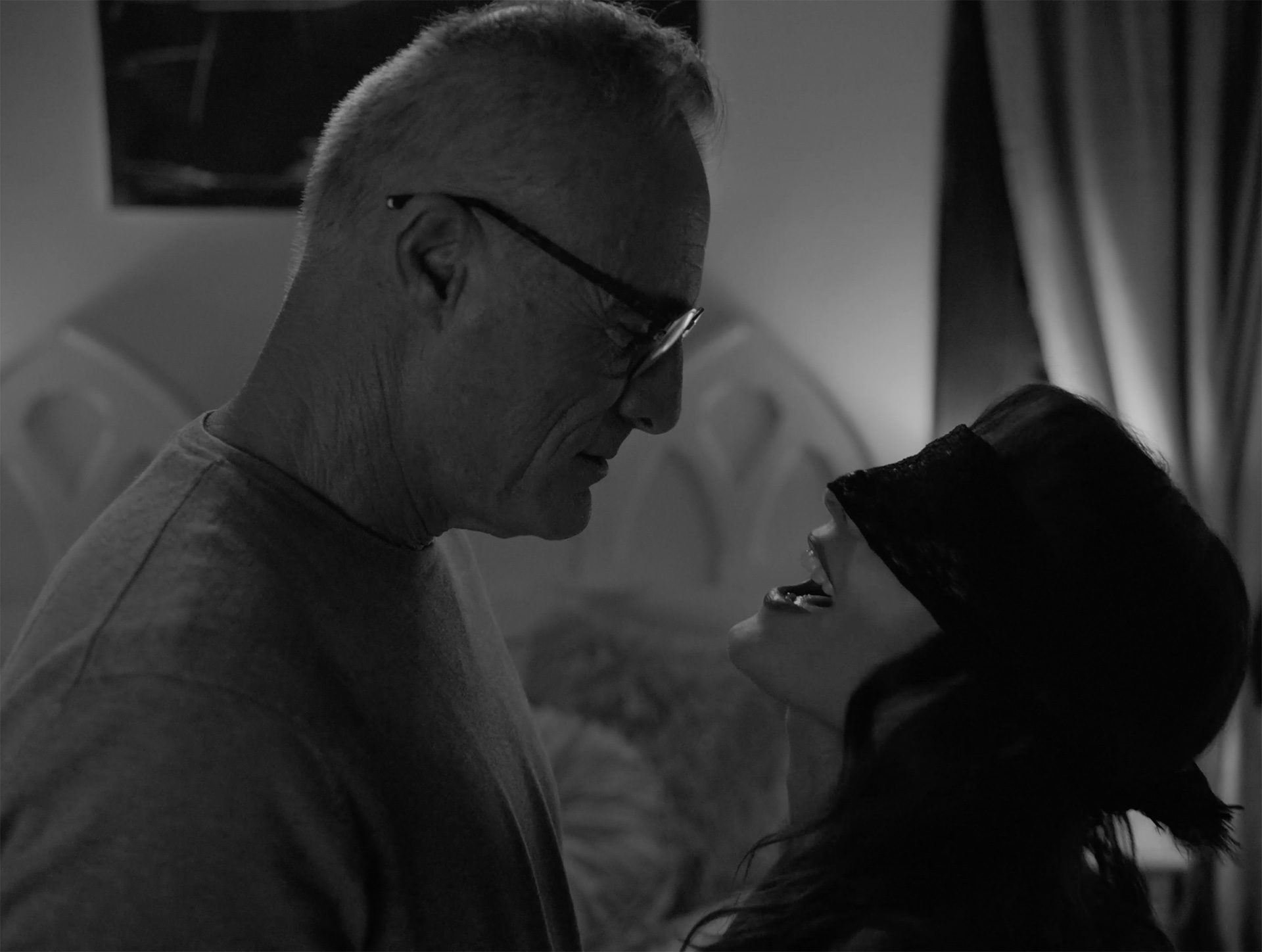It’s New Year’s Eve: Ben (Timothy V. Murphy) and Kat’s (Elisha Renee Sutton) last night in Los Angeles before heading to New York. He’s spearheading the move with a desire to rejuvenate his writing career after finding the growing chasm separating talent and fame in Hollywood too much to creatively bear. The change in scenery isn’t necessarily great for Kat’s career as a celebrity photographer, but she knows staying with Ben provides security for her young son Micah (T.K. Weaver) since his father (Neil Jackson’s Cam) is always away on assignment. The holiday is thus an excuse for one last hurrah amongst old friends before life pushes them apart. It might be their final time together. An opportunity for fun—and difficult, unspoken truths.
Director Nathan Sutton (who co-wrote with his wife Elisha) admits that New Year feels like a stage play, and could even benefit from the shift in medium if he ever decided to test that theory. It’s a full-frame, black-and-white drama set entirely at Ben and Kat’s home. Known guests arrive (Cam, Kyle Mac’s Julian, and Nelson Lee’s Joseph) with some newcomers in tow (Raven Scott as Cam’s girlfriend Meegan and Gillian Shure as Joseph’s agent Willa) to mine through communal history and excitement once small talk shifts towards past secrets. You have optimism against pessimism and superficial geniality against obvious distaste. Ben and Kat’s relationship is strained, nobody seems averse to talking about the others behind their backs, and a few drinks promise fireworks.
Willa becomes the linchpin, her unknown adoration for Ben’s work an impromptu spark down memory lane that quickly reveals the only reason any of them are here right now is because of his play. Joseph was the star. Julian was filming a making-of documentary. And I believe Kat was acting too? I’m fuzzy on that one, but it seems the logical reason she and Cam would be present. She’s now, of course, with Ben as Cam looks in from the outside. Julian never released his work and has struggled to find the footing to finish anything in the decade-plus since. And Joseph, despite seeming on a tear of late with high-profile casting announcements, is known more for a recent failed suicide attempt, courtesy substance abuse.
Did their trouble also begin the moment they crossed paths? Was that fateful experience less about making friends and more about destroying their lives? It’s a slippery slope. Good comes with bad, bad comes with good. Careers take off while others stagnate and even more change course altogether. And thinking about it all right now makes their present seem eerily familiar. Why are they together again? Ben decided the family was leaving. Ben, like he was the writer-director, is the man pulling the strings today. No one is particularly happy about it but none are willing to prevent him from doing so either. Unless, of course, memory bleeds back into their consciousness to take the stand they should have then. To ultimately place humanity above art.
Because that’s what this comes down to in the end. That monologue Ben has about celebrity warping the artform they all hold so dear is as true as it is a deflection from his own misdeeds. Yes, talent should be paramount. Opportunities born from it should breed fame rather than it be fame supplying opportunities to the talentless. It’s not an exact science considering Joseph’s career rejuvenation—Ben only has good things to say about his artistry—but it is something our society has embraced the past few decades in the commoditization of film and theater as vanilla money-making endeavors rather than envelope-pushing rebellion. Maybe Ben was a trailblazer, but at what cost? Does his domineering megalomania creating a masterpiece outweigh its destructive impact upon the others?
There are some interesting ideas bandied about and you get the sense the Suttons and their story partner Christian Williams are creating from experience and allowing their close-knit group of actors to imbue these roles with their own. Some scenes can come off stilted and the dialogue rushed, but the emotion and psychology shines through all that to really let the contrast between old- and new-school Hollywood play out by virtue of the cynically misunderstood (Ben), the sickly sweet positivity of youth (Meegan), and the damaged souls caught failing to straddle both those worlds. It’s the latter that prove so interesting as a result because they don’t dare anger the status quo despite knowing the pain its wrought upon them. Until they can no longer stay silent.
A voyeur is needed to shake them out of their smugly self-satisfied existences and easy white lies everyone sees through anyway. It’s young Micah roaming around in the background (he’s supposed to be in bed) that lends a surprising tension to the proceedings—we’re unsure what it is he actually hears or understands. He’s the one character here without a voice; his life dictated by the others’ actions, but not beholden to their insecurities or ego in a way that prevents him from taking a stand they won’t. So when the party shifts to an exercise in hard truths that expose the long-fractured cracks of this group, we must wonder when the smoking gun will arrive to wake them up and resolve to finally break the cycle.
New Year opens NYC’s Film Noire Theater and LA’s Laemmle Monica Film Center on December 15.

